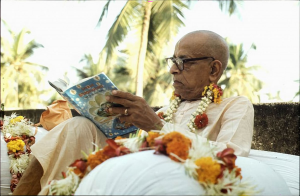
Surrender means that “I am surrendering to Kṛṣṇa with full faith that He is quite competent and able to give me protection.” This is called surrender. Not that hesitation: “Oh, I will surrender to Kṛṣṇa, and in case of danger, He may not be able to give me protection.” That is not surrender.
– Bhagavad-gītā 1.2-3 — London, July 9, 1973
Surrender means to accept favorable things, how I can make progress towards Kṛṣṇa, and prātikūlya, pratikūla means rejecting unfavorable things which are not very congenial for my progress to Kṛṣṇa consciousness.
– Bhagavad-gītā 18.67 — Ahmedabad, December 10, 1972
The śaraṇāgati means, surrender means that “Kṛṣṇa will save me. I, I’ll not do anything against the devotional service. Even there is torture…” Just like Prahlāda Mahārāja. He was tortured by his father. He had… Kṛṣṇa’s mother was tortured by his brother. Not outsider. So the demons are so rascal, they don’t care for son, sister, mother. No. “As soon as it is against my personal sense gratification, I must finish this.” But be sure that Kṛṣṇa will save.
– Śrīmad-Bhāgavatam 1.3.28 — Los Angeles, October 3, 1972
Surrender, means… Kṛṣṇa says that “You surrender unto Me,” sarva-dharmān parityajya [Bg. 18.66]. Let us believe this, that “Kṛṣṇa is asking to surrender. Let me surrender. He must protect me in danger.” That is called surrender.
– Śrīmad-Bhāgavatam 1.16.26-30 — Hawaii, January 23, 1974
Surrender means he has finished his all material business. No more.
– Śrīmad-Bhāgavatam 5.5.16 — Vṛndāvana, November 4, 1976
Surrender means you surrender and work as Kṛṣṇa says. That is surrender.
– Śrīmad-Bhāgavatam 6.1.3 — Melbourne, May 22, 1975
Surrender means I must be prepared to execute the will of Kṛṣṇa; not my whims, but Kṛṣṇa’s will.
– The Nectar of Devotion — Vṛndāvana, November 6, 1972
Compiled by Raghav Pandit Das
taken from vedaveda.com
(here below is what can be added to the above-how we can begin to learn how to surrender)
BG 15.5-One who is free from illusion, false prestige, and false association, who understands the eternal, who is done with material lust and is freed from the duality of happiness and distress, and who knows how to surrender unto the Supreme Person, attains to that eternal kingdom.
PURPORT-The surrendering process is described here very nicely. The first qualification is that one should not be deluded by pride. Because the conditioned soul is puffed up, thinking himself the lord of material nature, it is very difficult for him to surrender unto the Supreme Personality of Godhead. One should know by the cultivation of real knowledge that he is not lord of material nature; the Supreme Personality of Godhead is the Lord. When one is free from delusion caused by pride, he can begin the process of surrender. For one who is always expecting some honor in this material world, it is not possible to surrender to the Supreme Person. Pride is due to illusion, for although one comes here, stays for a brief time and then goes away, he has the foolish notion that he is the lord of the world. He thus makes all things complicated, and he is always in trouble. The whole world moves under this impression. People are considering that the land, this earth, belongs to human society, and they have divided the land under the false impression that they are the proprietors. One has to get out of this false notion that human society is the proprietor of this world. When one is freed from such a false notion, he becomes free from all the false associations caused by familial, social, and national affections. These fake associations bind one to this material world. After this stage, one has to develop spiritual knowledge. One has to cultivate knowledge of what is actually his own and what is actually not his own. And, when one has an understanding of things as they are, he becomes free from all dual conceptions such as happiness and distress, pleasure and pain. He becomes full in knowledge; then it is possible for him to surrender to the Supreme Personality of Godhead.


